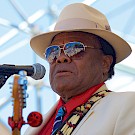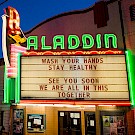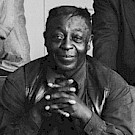
Thrash metal, J-pop and celebrity are three words rarely appearing in proximity to one another. Guitarist Marty Friedman may be the first to acknowledge this. Yet, he is perhaps the sole exception; the first to whom each applies in equal measure.
Murmurs of Friedman’s talent were first audible in the late 1980s when he paired with guitar prodigy Jason Becker in Cacophony, an instrumental metal group revered for amply showcasing the staggering instrumental competence of its principals. While Becker was tapped to replace Steve Vai in David Lee Roth’s solo band—then arguably rock’s most prominent gig—Friedman was selected by Dave Mustaine to complete what would become Megadeth’s signature lineup prior to the recording of 1990’s seminal Rust in Peace. Boasting well-developed instincts as a soloist and a formidable technique honed during his Cacophony tenure, Friedman’s singular phrasing and arcing, memorable leads helped propel Rust in Peace to platinum sales and a Grammy nomination, while situating Megadeth within a critical realm then accessible only to the likes of Metallica, Pantera and Slayer.
While Megadeth would continue to enjoy broad success upon the release of ensuing efforts, most notably Countdown to Extinction and Youthanasia, Friedman found himself dissatisfied with the attenuating pop influence that had become a fixture of the band’s musical direction. Finding inspiration in contemporary Japanese music, to which he was first exposed as a youth in Hawaii, Friedman would quit Megadeth in 2000, wholly vacate his stateside presence and relocate to Tokyo. Proficient in Japanese, which he learned during downtime while on tour with Megadeth, Friedman negotiated business contracts unassisted while actively seeking a point of entry into Japan’s notoriously insular music market, which by his estimate is almost entirely domestic in composition.
Remarkably, he would do so with great success. Upon landing a position backing J-pop superstar Aikawa Nanase, Friedman was sought for a TV role in Hebimeta San (Mr. Heavy Metal), a program predicated on the fusion of heavy metal and traditional Japanese songs in an episodic context. Recalling his journey to broader media stardom in a recent Rolling Stone feature, Friedman was initially hesitant to divert his attention from his newly won role with Nanase, but found the underlying premise sufficiently piquant such that he ultimately accepted the offer. Since then, Friedman has broadened his presence in Japanese media, appearing on TV several hundred times—most notably as the host of Rock Fujiyama—as well as on the radio and in film.
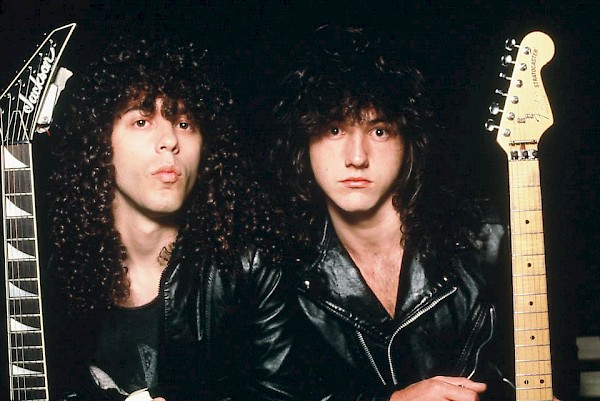 Friedman and Jason Becker back in their Cacophony days
Friedman and Jason Becker back in their Cacophony days
Currently in the midst of his first extended U.S. tour since relocating to Japan over a decade ago, Friedman will be performing at Portland’s Aladdin Theater on Sunday, September 27. Interviewed in advance of this appearance, Friedman discusses the impetus for the recording of Inferno, his latest release on Prosthetic Records which features Rodrigo y Gabriela and Danko Jones, and offers his take on progress in contemporary metal. Upon discussing the challenges of musical assimilation in Japan, Friedman closes by speaking about the process of writing the new song “Horrors” with Jason Becker, his close friend and former Cacophony bandmate, and on the growth of Becker’s striking compositional prowess, which remains thankfully robust in spite of the devastation wrought by a two-decade battle with ALS. For more information about Jason Becker, or to make a donation on his behalf, please visit his website.
You left the States and the American music scene for good in 2003, citing dissatisfaction with heavy music. Ironically, you’ve released the heaviest, most intense solo album of your career and you’re now touring stateside. What led to this point?
Marty Friedman: On Inferno, I knew I wanted to do things internationally—not just Japan. So I had to be honest with myself and say, “What does the whole world really want from me?” And it came down to me playing my ass off. So I decided to do that, and make it really heavy and really modern and new and fresh. I didn’t want to rehash any old stuff. I just wanted to do what I felt was new and modern and exciting. And so that’s how it came out.
In earlier interviews, I recall reading that you’ve said that prior to this album cycle, you didn’t realize that people in America were still following your career. Is that accurate?
I haven’t really followed what was going on in America since I’ve been in Japan. It’s very strange doing this tour right now because the support has been absolutely unbelievable every single night. I haven’t been in America for anything other than recording and stuff, so I’ve never played here, really. I had no idea if I had any fans, what they’re doing, if they’re going to show up, or what they want to hear. So there were a lot of nerves!
But as soon as I got here, the response just blew my mind. I don’t even have the words to tell you how excited I am with the fan response. Maybe it’s just because I’ve been gone for so long, I don’t know, but it’s just been great.
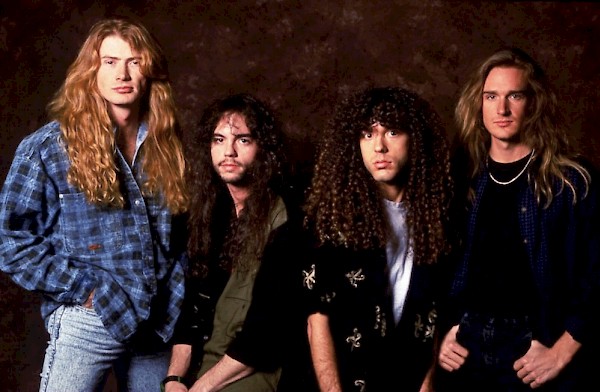 Friedman with Megadeth in the '90s
Friedman with Megadeth in the '90s
When I was preparing to talk to you, I tried to put myself in your shoes and think about what would have been lacking in metal at the time you left Megadeth, and later the United States altogether. I came up with the idea that, at its core, what was really missing was compositional and harmonic dynamism. Does that resonate with you at all?
I really just don’t know! I found that music in America, in general—not only metal—seemed to be less about the melody and more about maybe the artist’s personality, or the words, or the ability of the singer, or the ability of the guitarist—everything that I really don’t care much about. All I really care about is melody, for better or for worse. I’m a big melody nut. [Laughs]
In Japanese music—pop music, rock music, metal music, dance music, every kind of music—melody is king over there. And so now I’m kind of bringing that melodic sense back here in America, and the response here in these shows has been fantastic, so I think people are ready for melodies. And my melodies can be pretty strange and eclectic, but they’re melodies—not just a showcase of riffs and not just ad libbing all the time. It’s melody.
Melody is the main difference for me, anyway.
I feel like melody and harmony are still relatively unexplored in a lot of contemporary metal and heavier music, even though the genre seems perfectly suited to it.
I agree. And nowadays, there’s so many cooler things happening in metal and heavy music, or experimental music. And just metal—heavy music—is so much better than it was when I lived here. There’s stuff like Deafheaven—I don’t know if you call that metal, but it’s heavy like metal and it just feels fantastic—and there’s a lot of stuff like Skyharbor, who I’ve done a lot of work with. They’re extremely melodic and extremely heavy. Now it’s okay to be musical, where it didn’t seem to be so musical when I lived in America before. So I think I can accept the direction that music is going right now.
One band that comes to mind in that respect is Animals as Leaders. They actually sold out a pretty big venue the last time they played here! I hope it’s a sign that people are ready for more informed music on that order.
I think minds have opened up a lot more, and are accepting of things like Animals as Leaders, which is very experimental. There’s a lot of information in that music, you know? And I think that people are opening up to it.
As a writer, do you feel like it’s easier to come up with aggressive, technically demanding music as opposed to something meaningful and more inherently musical? Compositionally, it seems like those elements can become a crutch that musicians often revert to in the absence of something more substantive.
I don’t care anything at all about how demanding something is or how not demanding something is. It’s the farthest thing from my mind. I just write the music that I want to hear, and if it winds up being demanding, I’m usually not too happy about it because I’m a lazy bastard! [Laughs]
I don’t know about that—I’ve tried playing some of your stuff from back in the day. [Laughs]
I never cared about that. I’ve been playing guitar forever, so there’s nothing that will pose too much of a problem. The only thing I’m concerned about is when you listen to it—not when you watch it—but when you listen to it, does it make you feel good? And whatever it takes for me to get to that goal, I’ll do it. So sometimes things can seem demanding or not, but all I care about is the end result.
At what point in your playing career did you really start getting drawn to the sound of Japanese music? Elements of an Eastern sound—that lydian or major 7#4 tonality—are all over your work in Cacophony and on Dragon’s Kiss and even in Megadeth.
I lived in Hawaii when I was a teenager, and most of the good guitarists were copying Jeff Beck and Al Di Meola, Eddie Van Halen—all of those good guys. There were already 10 clones of each of those guys that were fantastic on every block, and I’m like, “I’m never going to be able to play like that.” So I heard Japanese traditional music, and the vocals just blew my mind. So I analyzed the vocals to the smallest detail, and I wound up soaking up a lot of very interesting things, and it really shaped my early music career.
With this in mind, was it ever a challenge to integrate yourself musically with a lot of the Japanese musicians that you ended up working with once you relocated?
Not really! Not really at all—absolutely not, come to think of it. Because, musically, I can relate to a lot of things that most foreigners cannot relate to, just because it was kind of embedded in my psyche from my teenage years. I could really relate to what Japanese people related to, so it was really no problem. Japanese language is tough, and it took a long time to get good, but like anything else, you just keep going.
Did you find that people there had fundamentally different instincts as to time, rhythm, composition or harmony and things like that?
Absolutely different! A thousand percent different—as different as you could possibly be. It’s like another planet. Luckily, I could adapt to it and keep my American self together too, so I wound up having a very strange musical identity.
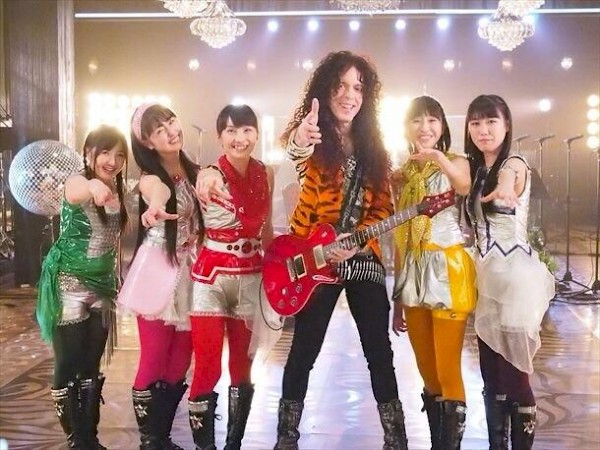 Friedman with J-pop group Momoiro Clover Z
Friedman with J-pop group Momoiro Clover Z
Are people there raised on more uniquely Japanese music? Or do they listen to a lot of American classic rock and things like that?
No! People grow up on Japanese music. Like 80 percent of the music they listen to is strictly Japanese. Maybe the amateur guitar players look to a lot of the flashy American and European guitarists, but with the vast majority of musicians in Japan, they might know about it but they didn’t grow up with it. The domestic music scene makes up about 80 percent of the music over there.
That’s actually really nice to hear.
Well, it’s more so now than in the ‘80s and the early ‘90s—it always wasn’t that way. There were a lot of really bad copies of Western music. Everybody just copied Billy Joel and Chicago and the Carpenters until it came out of their asses. I mean, everything boils down to taste and whether you like it or not—everybody’s different—but I prefer it now where it doesn’t really have that American influence.
Just briefly, if you can distill it, what is J-pop or contemporary Japanese music to you relative to something you might find in the United States.
The main element is the melody and kind of the happiness of it. It’s very aggressively happy. I find that there’s not a whole lot of happy music here in America, unless you’re talking about preschoolers’ nursery rhymes. Over there, it’s not embarrassing to be happy, and it’s also not embarrassing to put a heavy, aggressive beat behind that, and it’s also not embarrassing to play heavy guitar behind it. And anything goes, so those are the things that really attract me to it. I mean, everybody’s got to put up a front here in America, and there was a time when there was a subgenre called happy hardcore in the ‘90s—dance music—and that was pretty cool. I liked it, but in Japan, melody is pretty much king.
I was thrilled to see you’d done a track with Jason Becker on the new album (“Horrors”—listen below). I was wondering if you could speak to the nature of the collaborative process a little bit?
Well, it actually wasn’t much different than it was when we used to work together before. We would both come up with separate ideas, and I would usually do the majority of arranging and producing. So I would take his ideas and take my ideas and try to make some semblance of an arrangement and a song out of it. So he had plenty of ideas for me to go through, and I chose some stuff that I thought would work with what I was working on, and there we had it!
So really, it was a very comfortable process; you know, nothing very unusual. The only unusual thing was the fact that he didn’t play on it [due to his disease], so I had to have somebody play his parts.
Right. And who did you bring in to play his parts? Was it someone you were familiar with from Japan or Michael Lee Firkins, who I understand has performed some of Jason’s recent work?
No, it was a Canadian guy named Ewan Dobson. He’s like one of those YouTube guys who’s got 50 million people watching him—just a totally amazing guy. [Laughs]
I was strict on having him play the way Jason would have played, and he did such a fantastic job. It was literally like channeling Jason into the studio—it came out perfectly. So when I listen back to it, it feels like it’s me and Jason. I don’t get the feeling that there’s a third party involved. That was a very big self-sacrifice on his part, but it just shows what a great musician the guy is.
Absolutely. Copping the nuances and minutiae of someone else’s playing is definitely not easy to do—especially when it’s Jason Becker.
Right. And that’s a big thing; there’s not many guys who can do that. And the guys who can do it were not able to do it, so he saved me! [Laughs]
How would Jason send you ideas? Does he write music using the letter board?
That’s it! Just like the movie. If you see the movie Not Dead Yet, you’ll see the exact process. And actually one of the ideas in the song I used is from the movie. So check it out! It’s a great one. [Watch the trailer below.]
I understand he still writes a lot of music when he can.
A ton, yeah.
That’s just amazing. Compositionally, how have his abilities broadened since your time working together in Cacophony?
It just keeps getting better; he’s like a Beethoven. The growth of his compositions is unbelievable. Back when we were playing together, he was a fantastic guitarist. But now, and even many years ago, he was becoming an absolute monster genius composer and now it’s no different. He just keeps getting better.
I’ll have to look out for more of his recent work. He was always an unbelievable guitarist, but, to me, what sets him apart from a lot of his successors is his compositional ability and the harmonic instincts underlying it. I don’t think anyone has really matched that.
Yeah, it’s a different world.
In an interview on NPR earlier this year, I believe that you said you’d finally assumed your identity as a musician. Having gone back and listened to a lot of your earlier work prior to speaking with you, I feel like the qualities that make your music and your playing what they are have been there all along. In your opinion, what was missing?
Well, I don’t know if anything was missing, and that quote may have been taken out of context to some extent. But I probably meant something to the effect of I’m really, really pleased with the identity that I’m finding myself coming into now as a musician and an artist. You know, you have to reinvent yourself all the time.
For example, I like to use Madonna. Madonna is always at the cutting edge of whatever she’s trying to do and always breaking new barriers and just doing new things, and still expanding on her already rich career as an artist. So I like to look at her as an example.
But I look at the output that I’ve done in the last couple years, and I’m way, way, way more pleased with it than the stuff I did before, which, of course, I love too. And I’m playing a lot of older stuff now on tour. It’s fun to play and people like to hear it. But when it comes to the new stuff, it’s just so much more of what I represent myself as today. So it’s more reinventing yourself, and I think it’s a must if you want to continue being an artist of any kind. You can’t do the same thing over and over again.
Right. So ultimately it’s a question of evolution and not a developmental endpoint.
No, it’s definitely not the end. Who knows what I’ll do next year! [Laughs]

